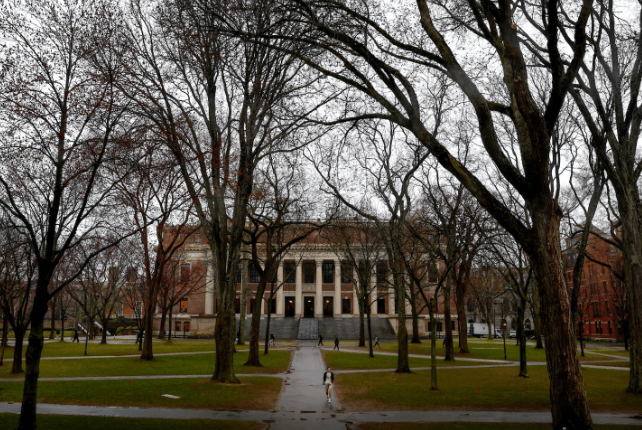哈佛大学拒绝遵守特朗普的要求,称不会“允许自己被联邦政府接管”

【中美创新时报2025 年 4 月 15 日编译讯】(记者温友平编译)哈佛大学无视特朗普政府强制改变政策和联邦政府对学校事务进行监督的企图,数小时后,美国政府于周一晚间予以强烈反击,宣布冻结与哈佛大学相关的超过 20 亿美元的联邦资金。《波士顿环球报》记者迈克·达米亚诺对此作了下述报道。
特朗普政府反犹太主义工作组在宣布冻结资金的新闻稿中表示:“哈佛大学今天的声明强化了我国最负盛名的大学和学院普遍存在的令人不安的权利心态——即联邦投资并不附带维护民权法的责任。”
周一早些时候,该大学表示不会接受周五晚间学校领导收到的一系列特殊要求 。这些要求包括废除多元化项目、将招生和招聘数据移交给联邦政府、对被校方指控为反犹太主义的特定学术项目进行外部审计,以及在外国学生违反校园规定时向联邦当局报告。
该工作组表示,哈佛大学必须接受这些要求,以维持其“与联邦政府的财务关系”。
哈佛大学校长艾伦·加伯在周一下午的一封公开信中表达了强烈的抗议。 “任何政府——无论哪个政党执政——都不应该规定私立大学可以教授什么课程、可以招收和聘用哪些学生,以及可以开展哪些研究和探究领域,”他说道。
这一回应引发了哈佛大学——美国历史最悠久、最富有、最负盛名的大学——与 特朗普总统之间的一场高风险对峙,事关90亿美元的研究经费。这场纠纷很可能将诉诸联邦法院。
工作组于3月31日对这笔资金进行了审查,其中大部分资金用于支持从创伤性脑损伤到结核病等主题的生物医学研究。周一晚间,尚不清楚哪些拨款和合同将被冻结。
在周一的一封信中,哈佛大学的外部律师威廉·伯克 (William Burck) 和罗伯特·赫尔 (Robert Hur) 表示,政府的 要求超出了联邦政府的“合法权限”,并表示学校将拒绝遵守。
他们写道:“哈佛大学或任何其他私立大学都不能允许自己被联邦政府接管。”
哈佛大学的立场是迄今为止对特朗普政府打压精英大学举措最有力的反击。联邦官员指责特朗普政府向精英大学灌输左翼意识形态,并导致反犹太主义滋生。最近几周,政府威胁要停止对至少七所学校的联邦资助,原因是这些学校涉嫌在反犹太主义、多元化项目以及跨性别运动员参与女子体育项目方面侵犯公民权利。
哈佛大学的反抗与哥伦比亚大学领导层的做法形成了鲜明对比。哥伦比亚大学上个月默许了特朗普政府的一系列要求。当时,学校临时校长及其董事会承诺改变学生纪律处分程序,并对中东研究系进行新的监管,以及其他一些措施。
自特朗普开始对大学施压以来,教职员工、学生、倡导团体以及剑桥市政府本身就一直敦促哈佛大学领导层抵制政府干预校务。周六,包括剑桥市市长E·丹尼斯·西蒙斯在内的数百人冒雨聚集在剑桥公园,敦促哈佛大学拒绝特朗普的要求。周一,哈佛大学附属医院麻省总医院(Mass General Brigham)的200多名医生和工作人员签署了一封公开信,敦促校领导层挺身而出对抗特朗普政府。
泰勒·考沃德(Tyler Coward)是倡导言论自由的组织“个人权利与言论基金会”的律师,他将政府的策略描述为非法滥用政府权力,并对哈佛大学的回应表示赞扬。
“从这件事一开始我们就一直在说,需要一个机构站出来维护自己的权利,才能结束这一切,”他说。“值得庆幸的是,哈佛大学选择了与哥伦比亚大学不同的道路,并正在维护自己的权利,避免遭到联邦政府的恶意收购。”
他说,哈佛大学的下一步行动是就资金冻结提起诉讼。
共和党女议员埃莉斯·斯特凡尼克 (Elise Stefanik) 于 2023 年帮助启动了国会对哈佛大学反犹太主义回应的调查,她谴责了哈佛大学的反应。
“哈佛大学理所当然地成为了高等教育道德和学术腐败的缩影,”哈佛毕业生斯特凡尼克在一份声明中表示。“现在是时候彻底切断美国纳税人对这所未能践行其建校格言‘真理’(Veritas)的大学的资助了。”
特朗普政府的支持者表示,在哈佛大学拒绝其要求后,政府必须坚持立场。肯尼斯·马库斯表示,哈佛的信誉“岌岌可危”。 他的倡导组织路易斯·D·布兰代斯中心曾以反犹太主义为由起诉哈佛大学。
他在工作组宣布冻结资金的几个小时前接受采访时表示:“如果特朗普政府现在不做出有力回应,名单上的许多其他大学就不会认真对待它。”
针对哈佛大学及其同行的大多数指控 源于联邦官员所称的未能保护犹太学生免受校园抗议活动引发的反犹太主义骚扰。 其他指控则涉及多元化项目(特朗普政府认为这些项目具有歧视性),以及跨性别运动员参与女子体育项目。
教育部还表示,至少有60 所学院和大学因其对反犹太主义的反应而受到调查。
该工作组在周一晚间宣布资金冻结时表示:“近年来困扰校园的学习中断是不可接受的。对犹太学生的骚扰更是令人无法容忍。如果精英大学希望继续获得纳税人的支持,现在是时候认真对待这个问题并致力于做出有意义的改变。”
加伯曾多次表示,反犹太主义是哈佛大学的一个问题,学校正在努力解决。哈佛大学已经采取了一系列措施,包括实施新的校园抗议管理规定,更换被指控对以色列教学存在偏见的学术中心的领导层,以及采用特朗普政府青睐的反犹太主义定义。
哈佛大学与特朗普政府反犹太主义特别工作组之间的反复交锋始于3月31日。当时,特别工作组承认了哈佛大学的努力,但表示仍在审查哈佛大学及其附属机构(包括麻省总医院、波士顿儿童医院和布罗德研究所)数十亿美元的联邦资金。4月3日,特别工作组提出了初步要求清单。随后,上周五,政府向哈佛大学发送了一份更详细的要求说明。
周五的信函内容更加广泛和具体。 它 指示哈佛大学实施“择优录取”的招生和聘用制度,并表示学校必须消除所有基于种族、宗教、性别或国籍的偏好。
委员会责令哈佛大学对学生、教职员工和领导层进行审计,以确保其“观点多元化”,并向政府报告审计结果。委员会还表示,哈佛大学必须对学术招聘和招生制度进行改革,以确保教职员工和学生的意识形态多元化。
委员会要求修改学生纪律处分程序,并禁止佩戴遮盖抗议者身份的面具。委员会表示,哈佛大学“必须调查过去两个学年发生的所有违规行为,并对其实施切实有效的纪律处分”。委员会还表示,哈佛大学必须“改革”其招收国际学生的方式,以筛选出任何“敌视”“美国价值观”或“支持恐怖主义或反犹太主义”的人。
委员会还表示,大学必须“无论以何种名义”废除所有多元化、公平和包容性项目及政策,这显然是指自特朗普采取行动禁止DEI项目以来,一些大学试图更改这些项目的名称。委员会还规定,必须在2025年8月之前“向政府提交一份经认证准确无误的报告,以确认这些改革”。
这封信由美国总务管理局(GSA)高级官员乔希·格伦鲍姆(Josh Gruenbaum)、卫生与公众服务部代理总法律顾问肖恩·凯文尼(Sean Keveney)以及教育部代理总法律顾问托马斯·惠勒(Thomas Wheeler)共同签署。格伦鲍姆和凯文尼已被公开认定为该政府反犹太主义工作组成员。
哈佛大学律师在周一的回应中 表示,该校在过去 15 个月中“采取了实质性的政策和计划措施”,以打击反犹太主义、促进意识形态多样性并维护校园秩序。
“哈佛大学仍然愿意就学校过去以及未来为改善社区每位成员的体验所做的工作进行对话。 但哈佛大学不准备接受超出本届或任何一届政府合法权限的要求,”律师写道。
在周一的一次采访中,哈佛大学本科生亚历山大·贝努瓦 (Alexandre Benoit) 表示,他对哈佛大学对政府的回应“非常满意”。
他说:“我们很多人都担心哥伦比亚大学会发生类似的事情,担心学校会默许特朗普的要求。”
不过,他说,许多学生担心一些课程,特别是研究生院的课程,可能会受到影响。
《环球报》记者 Emily Spatz 对本文亦有贡献。
题图:2025 年 4 月 3 日,马萨诸塞州剑桥市哈佛大学怀德纳图书馆。Craig F. Walker/《波士顿环球报》员工
Harvard refuses to comply with Trump’s demands, says it won’t ‘allow itself to be taken over by the federal government’
By Mike Damiano Globe Staff,Updated April 14, 2025
The Widener Library at Harvard University in Cambridge, MA on April 3, 2025.Craig F. Walker/Globe Staff
Hours after Harvard University defied the Trump administration’s attempt to force policy changes and federal oversight of the school’s affairs, the government hit back hard Monday night, announcing a freeze of more than $2 billion in federal funding tied to Harvard.
“Harvard’s statement today reinforces the troubling entitlement mindset that is endemic in our nation’s most prestigious universities and colleges — that federal investment does not come with the responsibility to uphold civil rights laws,” the Trump administration’s antisemitism task force said in a press release announcing the funding freeze.
Earlier Monday, the university had said it would not acquiesce to a list of extraordinary demands sent to the school’s leaders on Friday night. The demands included abolishing diversity programs, turning over admissions and hiring data to the federal government, commissioning external audits of specific academic programs the administration accused of antisemitism, and alerting federal authorities whenever a foreign student violated campus rules.
The task force said Harvard must accept those demands to maintain its “financial relationship with the federal government.”
In an open letter Monday afternoon, Harvard president Alan Garber was defiant. “No government — regardless of which party is in power — should dictate what private universities can teach, whom they can admit and hire, and which areas of study and inquiry they can pursue,” he said.
That response set up a high-stakes standoff between Harvard — the country’s oldest, wealthiest, and most prestigious university — and President Trump, with $9 billion in research funding on the line. The dispute is now likely headed to federal court.
Much of the funding at stake, which the task force placed under review on March 31, supports biomedical research on subjects from traumatic brain injuries to tuberculosis. It was not immediately clear Monday night which grants and contracts were to be frozen.
In a Monday letter, Harvard’s outside attorneys, William Burck and Robert Hur, said the administration’s demands exceeded the “lawful authority” of the federal government and said the school would refuse to comply.
“Neither Harvard nor any other private university can allow itself to be taken over by the federal government,” they wrote.
Harvard’s stance is the most forceful pushback yet against the Trump administration’s crackdown on elite universities, which federal officials accuse of indoctrinating students into left-wing ideology and allowing antisemitism to fester. In recent weeks, the government has threatened the federal funding of at least seven schools over alleged civil rights violations related to antisemitism, diversity programs, and the participation of transgender athletes in women’s sports.
Harvard’s defiance is a sharp contrast to the approach taken by Columbia University’s leaders, who acquiesced to a list of demands from the Trump administration last month. There, the school’s interim president and its board promised to change student disciplinary procedures and place a Middle East studies department under new oversight, among other measures.
Since the beginning of Trump’s pressure campaign against universities, faculty, students, advocacy groups, and the City of Cambridge itself had urged Harvard’s leaders to resist government interference in the school’s affairs. On Saturday, hundreds of people, including Cambridge Mayor E. Denise Simmons, gathered in the rain on Cambridge Common and pressed Harvard to reject Trump’s demands. On Monday, more than 200 doctors and staffers at Mass General Brigham, a Harvard-affiliated hospital, signed an open letter urging their leaders to stand up to the Trump administration.
Tyler Coward, a lawyer with the Foundation for Individual Rights and Expression, a free speech advocacy group, described the administration’s tactics as unlawful abuses of government power, and praised Harvard’s response.
“We’ve been saying since this started that it’s going to take an institution standing up for its own rights to put an end to this,” he said. “Thankfully, Harvard chose a different course than Columbia and is asserting its rights to remain free from a hostile takeover from the federal government.”
He said the next move for Harvard is to sue over the funding freeze.
Elise Stefanik, a Republican congresswoman who helped launch a congressional investigation into Harvard’s response to antisemitism in 2023, condemned the university’s response.
“Harvard University has rightfully earned its place as the epitome of the moral and academic rot in higher education,” Stefanik, a Harvard graduate, said in a statement. “It is time to totally cut off US taxpayer funding to this institution that has failed to live up to its founding motto Veritas.”
Supporters of the Trump administration said it had to stand its ground after Harvard rejected its demands. Its credibility was “on the line,” said Kenneth Marcus, whose advocacy group, the Louis D. Brandeis Center, sued Harvard over antisemitism.
“If the Trump administration doesn’t respond forcefully now, it won’t be taken seriously by the many other universities that are on its list,” he said in an interview hours before the task force announced the funding freeze.
Most of the accusations against Harvard and its peers stem from what federal officials describe as the universities’ failure to protect Jewish students from antisemitic harassment stemming from the campus protests over the Israel-Hamas war. Other accusations relate to diversity programs, which the Trump administration says are discriminatory, and the participation of transgender athletes in women’s sports.
The Department of Education has also said at least 60 colleges and universities are under investigation for their response to antisemitism.
In its announcement of the funding freeze Monday night, the task force said: “The disruption of learning that has plagued campuses in recent years is unacceptable. The harassment of Jewish students is intolerable. It is time for elite universities to take the problem seriously and commit to meaningful change if they wish to continue receiving taxpayer support.”
Garber has repeatedly said antisemitism is a problem at Harvard that the school is working to address. The university has already taken a number of steps, including enforcing new rules governing campus protests, moving to change the leadership of an academic center accused of biased teaching on Israel, and adopting a definition of antisemitism favored by the Trump administration.
The back and forth between Harvard and the Trump administration’s antisemitism task force began on March 31, when the task force acknowledged Harvard’s efforts but said it was nevertheless reviewing billions in federal funding for Harvard and its affiliates, including Mass General Brigham, Boston Children’s Hospital, and the Broad Institute. It followed up with an initial list of demands on April 3. Then, last Friday, the government sent Harvard a more detailed explanation of its demands.
The Friday letter was far more extensive and specific. It directed Harvard to implement “merit-based” admissions and hiring practices, saying the school must eliminate all preferences based on race, religion, sex, or national origin.
It ordered Harvard to undertake an audit of the student body, faculty, staff, and leadership to ensure sufficient “viewpoint diversity,” and report the results of the audit to the government. Then, it said, the university must make changes in academic hiring and admissions to ensure faculty and students are ideologically diverse.
It mandated changes to student disciplinary procedures and a ban on masks that conceal protesters’ identities. It said Harvard “must investigate and carry out meaningful discipline for all violations that occurred” during the past two academic years. It said the university must “reform” the way it admits international students to screen out anyone “hostile” to “American values” or “supportive of terrorism or antisemitism.”
It also said the university must abolish all diversity, equity, and inclusion programs and policies “under whatever name,” an apparent reference to some universities’ attempts to change DEI programs’ names since Trump moved to ban them. It gave a deadline of August 2025 to “submit to the government a report — certified for accuracy — that confirms these reforms.”
The letter was signed by Josh Gruenbaum, a top official at the US General Services Administration; Sean Keveney, acting general counsel at the Department of Health and Human Services; and Thomas Wheeler, acting general counsel at the Department of Education. Gruenbaum and Keveney have been publicly identified as members of the administration’s antisemitism task force.
In their response Monday, Harvard’s lawyers said the university “has undertaken substantial policy and programmatic measures” during the past 15 months to fight antisemitism, promote ideological diversity, and maintain order on campus.
“Harvard remains open to dialogue about what the university has done, and is planning to do, to improve the experience of every member of its community. But Harvard is not prepared to agree to demands that go beyond the lawful authority of this or any administration,” the lawyers wrote.
In an interview Monday, Alexandre Benoit, a Harvard undergraduate, said he was “quite happy” with Harvard’s response to the government.
“A lot of us were worried that a similar thing would happen here that happened at Columbia, and that the school would acquiesce to Trump’s demands,” he said.
Still, he said, many students are afraid that some programs, particularly in the graduate schools, could suffer.
Globe correspondent Emily Spatz contributed to this article.

